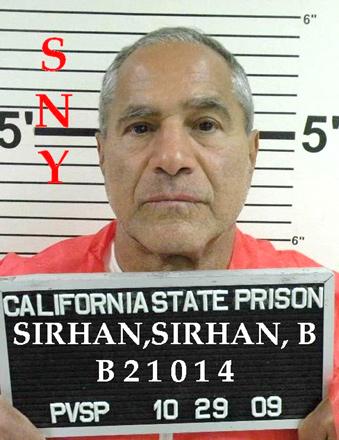- International News
- Sun-2021-08-29 | 03:12 pm

Nayrouz News Agency :
The man convicted of shooting dead Robert F. Kennedy in a 1968 assassination that rocked the United States was granted parole on Friday.
Sirhan Sirhan, now 77, has been behind bars for five decades — despite doubts that he fired the shots that likely changed the course of US politics.
Kennedy, the younger brother of slain president John F. Kennedy, was campaigning for the Democratic nomination when he was gunned down in a Los Angeles hotel.
His murder came just months after the killing of Black civil rights leader Martin Luther King Jr, and as a divided America was deep in an unpopular war in Vietnam.
Sirhan was convicted and sentenced to death in 1969 after pleading guilty.
His death sentence was commuted to life imprisonment several years later.
But doubts soon surfaced that he was actually responsible for Bobby Kennedy’s death, with claims that there could have been a second gunman in the Ambassador Hotel on June 5, 1968.
‘Wrong person’
Kennedy had given a speech at the hotel after winning California’s Democratic presidential primary.
On a walkabout in the kitchen where he met staff, he was shot, as were several other people in his entourage, among them Paul Schrade, who took a bullet to the head.
Schrade, along with Kennedy’s then-14-year-old son, have since campaigned for Sirhan’s release, saying the evidence against him does not stack up.
"It is a good decision,” Schrade told AFP on Friday.
"I’m really grateful to the parole board for giving Sirhan the chance to go home.”
The vote on Friday by a two-person panel of the California parole board does not mean that Sirhan will automatically be released.
The decision is subject to a three-month review, and then ultimately passes to state Governor Gavin Newsom, a Democrat who faces a recall vote in September.
During Friday’s hearing, Kennedy’s youngest son, Douglas, spoke in favor of Sirhan’s release, media reports said, adding that Robert F. Kennedy Jr. had sent a letter of support to the parole board.
Robert F Kennedy Jr. told The Washington Post in 2018 that he had visited Sirhan in the California desert prison where he was serving his sentence, and had become convinced that an injustice had been perpetrated.
"I went there because I was curious and disturbed by what I had seen in the evidence,” he told the paper.
"I was disturbed that the wrong person might have been convicted of killing my father.”
"My father was the chief law enforcement officer in this country. I think it would have disturbed him if somebody was put in jail for a crime they didn’t commit.”
Uncertainty over Sirhan’s guilt began during his trial, when prosecutors produced an autopsy report that showed Kennedy was shot at point-blank range from behind.
Witnesses said Sirhan was standing in front of him.
Over the years and in numerous appeals, evidence emerged that as many as 13 shots were fired that night.
The weapon Sirhan was found to have fired could hold only eight bullets.
Sirhan, a Palestinian Christian, was said at his trial to have hated Kennedy because of his support for Israel.
Dynasty
After RFK’s death, Hubert Humphrey captured the Democratic nomination. But his closeness to Lyndon Johnson and the unpopular Vietnam War saw the general election go to Richard Nixon.
The ongoing controversy has echoes of the 1963 killing of John F. Kennedy, in which some historians insist more than one gunman was involved.
The Kennedy dynasty is often described as the closest thing the United States has to royalty.
Their wealth and political power has captivated generations of Americans — as have the scandals in which they have become embroiled.
John F. Kennedy was alleged to have had connections to the mob, and was reported to have had affairs with screen sirens Marilyn Monroe and Marlene Dietrich.
Most infamously, Senator Ted Kennedy — Bobby and John’s brother — was behind the wheel in 1969 when his car crashed into a pond, trapping 28-year-old Mary Jo Kopechne inside.
He fled the scene and Kopechne died.
The so-called "Chappaquiddick Incident” left a stain on the family legacy.













